Tuesday Poster Session
Category: Practice Management
P4048 - Increasing Accuracy of Colonoscopy Indication Through Electronic Medical Record Changes: A Quality Improvement Project
Tuesday, October 24, 2023
10:30 AM - 4:00 PM PT
Location: Exhibit Hall

Has Audio

Kaitlyn Carlson, MD, MPH
Baylor College of Medicine
Houston, TX
Presenting Author(s)
Kaitlyn Carlson, MD, MPH1, Disha Kumar, MD1, Lauren L. Comer, MD1, Frederick Peng, MD1, Andrew Zimolzak, MD2, Wendy Podany, MD3, Kamal Hirani, MD4, Rhonda Cole, MD4, Lindsay Vaclavik, MD4, Molly Horstman, MD, MS3, Scott Larson, MD, PhD4
1Baylor College of Medicine, Houston, TX; 2Baylor College of Medicine / Michael E. DeBakey Veterans Affairs Medical Center, Houston, TX; 3Michael E. Debakey VA Medical Center, Houston, TX; 4Michael E. DeBakey VA Medical Center, Houston, TX
Introduction: Accurate documentation of colonoscopy indication is a quality indicator for colonoscopy and increases efficiency of referral review. At the local VA hospital, positive fecal immunochemical test (FIT) was not a listed indication for ordering colonoscopy, forcing providers to write the indication in as a free-text option. This led to providers sometimes writing a less specific “screening” as the indication when FIT was positive or choosing “hematochezia” and adding “positive FIT” in the comments, causing to a lack of clarity for providers screening referrals. This quality project aimed to improve the ease of ordering a colonoscopy for positive FIT and increase the accuracy in colonoscopy indication among colonoscopies ordered for positive FIT.
Methods: Interviews with primary care providers were held to discuss the process for ordering colonoscopy and possible improvements. Based on these interviews, changes were made in the electronic medical record (EMR) colonoscopy order set. “Positive FIT kit” was created as a listed option for diagnostic colonoscopy indication. Order set changes were implemented in the medical record and education was provided to primary care providers on how to use the new order set. Colonoscopy orders were reviewed for indication before and after the changes were made in two-week blocks. The outcome measure was the percentage of colonoscopy orders for patients with positive FIT ordered with positive FIT listed as the sole indication. A run chart was used for analysis.
Results: Before the intervention, the percent colonoscopies for positive FIT ordered with solely positive FIT as the indication was 52.2% on average. This average increased to 88.5% during the weeks after the implementation of order set changes. Figure 1 is a run chart which illustrates the percent of correctly ordered colonoscopies for FIT positive indication per two-week block. There is a 6-point shift after the intervention which suggests special cause variation and a significant increase in colonoscopies ordered for positive FIT.
Discussion: The shift suggests that the order set change led to an increase in providers selecting only FIT positive as the indication for colonoscopy. This quality improvement project successfully improved accuracy of colonoscopy indication at our institution. Provider education can continue to reinforce appropriate documentation.

Disclosures:
Kaitlyn Carlson, MD, MPH1, Disha Kumar, MD1, Lauren L. Comer, MD1, Frederick Peng, MD1, Andrew Zimolzak, MD2, Wendy Podany, MD3, Kamal Hirani, MD4, Rhonda Cole, MD4, Lindsay Vaclavik, MD4, Molly Horstman, MD, MS3, Scott Larson, MD, PhD4. P4048 - Increasing Accuracy of Colonoscopy Indication Through Electronic Medical Record Changes: A Quality Improvement Project, ACG 2023 Annual Scientific Meeting Abstracts. Vancouver, BC, Canada: American College of Gastroenterology.
1Baylor College of Medicine, Houston, TX; 2Baylor College of Medicine / Michael E. DeBakey Veterans Affairs Medical Center, Houston, TX; 3Michael E. Debakey VA Medical Center, Houston, TX; 4Michael E. DeBakey VA Medical Center, Houston, TX
Introduction: Accurate documentation of colonoscopy indication is a quality indicator for colonoscopy and increases efficiency of referral review. At the local VA hospital, positive fecal immunochemical test (FIT) was not a listed indication for ordering colonoscopy, forcing providers to write the indication in as a free-text option. This led to providers sometimes writing a less specific “screening” as the indication when FIT was positive or choosing “hematochezia” and adding “positive FIT” in the comments, causing to a lack of clarity for providers screening referrals. This quality project aimed to improve the ease of ordering a colonoscopy for positive FIT and increase the accuracy in colonoscopy indication among colonoscopies ordered for positive FIT.
Methods: Interviews with primary care providers were held to discuss the process for ordering colonoscopy and possible improvements. Based on these interviews, changes were made in the electronic medical record (EMR) colonoscopy order set. “Positive FIT kit” was created as a listed option for diagnostic colonoscopy indication. Order set changes were implemented in the medical record and education was provided to primary care providers on how to use the new order set. Colonoscopy orders were reviewed for indication before and after the changes were made in two-week blocks. The outcome measure was the percentage of colonoscopy orders for patients with positive FIT ordered with positive FIT listed as the sole indication. A run chart was used for analysis.
Results: Before the intervention, the percent colonoscopies for positive FIT ordered with solely positive FIT as the indication was 52.2% on average. This average increased to 88.5% during the weeks after the implementation of order set changes. Figure 1 is a run chart which illustrates the percent of correctly ordered colonoscopies for FIT positive indication per two-week block. There is a 6-point shift after the intervention which suggests special cause variation and a significant increase in colonoscopies ordered for positive FIT.
Discussion: The shift suggests that the order set change led to an increase in providers selecting only FIT positive as the indication for colonoscopy. This quality improvement project successfully improved accuracy of colonoscopy indication at our institution. Provider education can continue to reinforce appropriate documentation.

Figure: Figure 1. The Percentage of Colonoscopies Ordered for Positive FIT with Indication Documented as Positive FIT over Time
Disclosures:
Kaitlyn Carlson indicated no relevant financial relationships.
Disha Kumar indicated no relevant financial relationships.
Lauren L. Comer indicated no relevant financial relationships.
Frederick Peng indicated no relevant financial relationships.
Andrew Zimolzak indicated no relevant financial relationships.
Wendy Podany indicated no relevant financial relationships.
Kamal Hirani indicated no relevant financial relationships.
Rhonda Cole indicated no relevant financial relationships.
Lindsay Vaclavik indicated no relevant financial relationships.
Molly Horstman indicated no relevant financial relationships.
Scott Larson: Motus GI – Consultant.
Kaitlyn Carlson, MD, MPH1, Disha Kumar, MD1, Lauren L. Comer, MD1, Frederick Peng, MD1, Andrew Zimolzak, MD2, Wendy Podany, MD3, Kamal Hirani, MD4, Rhonda Cole, MD4, Lindsay Vaclavik, MD4, Molly Horstman, MD, MS3, Scott Larson, MD, PhD4. P4048 - Increasing Accuracy of Colonoscopy Indication Through Electronic Medical Record Changes: A Quality Improvement Project, ACG 2023 Annual Scientific Meeting Abstracts. Vancouver, BC, Canada: American College of Gastroenterology.
